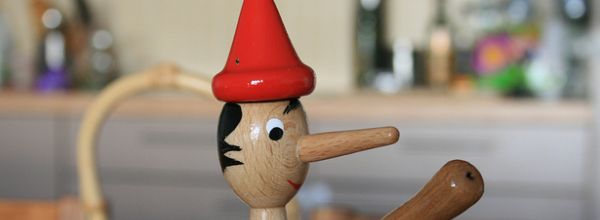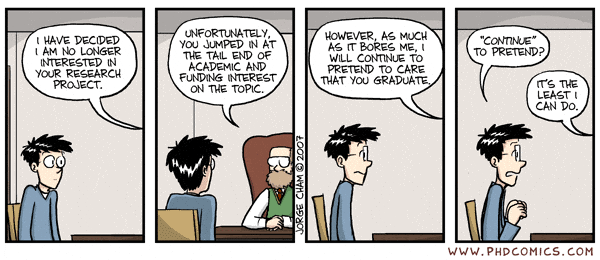The Importance of Delegation for Scientists
The art of delegation can help save time and give you a happy, more productive lab life. Discover how with our easy guide to delegation for scientists.
Join Us
Sign up for our feature-packed newsletter today to ensure you get the latest expert help and advice to level up your lab work.

The art of delegation can help save time and give you a happy, more productive lab life. Discover how with our easy guide to delegation for scientists.

The lab is a melting-pot full of workers from different cultures and backgrounds, so some conflicts of personality are inevitable. However, when the lab head is the person that you are struggling to get along with, it can make your life a lot harder. Check out some different personality types and get advice on how to work with them effectively.

Are you mentoring an intern and nervous about how to be a good boss? This quirky and offbeat article has got some great tips!

I have been teaching scientific laboratory courses for years. While I was an undergraduate student, I worked as a laboratory teaching assistant for Organismal Biology and volunteered for “Super Science Saturday’s” to educate youth through science demonstrations. I gradually moved on to universities that allowed me to independently instruct students in Anatomy and Neuroscience. Today,…

I received a very late diagnosis of Asperger syndrome, when I was already twenty. Before that, I was ashamed of my “social awkwardness”, but my passion for life sciences and research relieved me of my sorrow. After I learned about my condition, I was able to self-accept and be proud of myself (and continued to…

How time flies. One day you are giving your first presentation in front of your fellow students, seemingly the next you are listening to a presentation by your own student. And frankly, the talk is awful. It’s twice the time limit, the student weaves around the topic as a drunken sailor, and she acknowledges her…
When working very closely with a team of people in the lab, you will have disagreements leading to conflict. That’s just human nature, hence the origin of a common phrase, “Can’t we all just get along?” If you are lucky, you will be able to resolve the conflict. But then the question becomes, how will this…

It’s often said that great leaders have a knack for bringing out the best in those that follow. In turn, followers enjoy the work they do and will take the initiative to soar far above and beyond what is asked of them. A less effective scientific leader may unknowingly squander potential that might have flourished…

A good scientist must see to believe… but if you just landed in the lab and things aren’t working, maybe it’s not you. We all love to try and save our hypothesis, but in this publish or perish climate, looking the other way during truth bending happens, and it happens a lot. Here are some…

One of the many perks that we often experience as graduate students is the chance to work with a collaborating lab on a research project. A successful collaboration results in: I recently came back from a visit to one of my collaborator’s lab, and wanted to share the aspects that I felt were most important…
Need tips for surviving being the newbie of the lab, and what you can do to handle all the possible personality types you may encounter. Read on.
A busy research lab can be a challenging place to work for a variety of reasons. Science is a high pressure environment, often with looming grant or research paper deadlines, troublesome reagents, and experimental failure. Combined, these factors can cause many kinds of strife in the workplace, here are a few examples and some of my top tips for dealing with them!
There are many kinds of supervisors out there, ranging from the amazingly laid back to the crazy micromanagers. There are various strategies for dealing with all of them, but what do you do when your boss is a bully?

From one lowly PhD student to another: we need post doctoral scientists. From their ability to seemingly do everything right to their moral support after a weekend of failed experiments and questioning the decisions that led you up to this moment * clears throat *. The list of support post docs offer is endless. So…
Greetings, I’m a research student and I’m having a lot of trouble in finding the right antibodies for my study, because I need both monoclonal and polyclonal. And I need to start addressing some other international scientists. The problem is that I don’t know how to address the situation. If they indeed have antibodies that…

Few scientists in the training stage are lucky enough to have the perfect advisor (aka PhD supervisor PI, boss). The reality is that most scientific advisors receive little to no training on how to be good mentors. You may want to take a look at a companion post to this one called “Getting the Most…

The monthly meeting with your supervisor is approaching and you are getting nervous. What can you do to get the most out of it? For starters, let’s hope that you are actually having regular, one-to-one meeting with your lab head. If not, you have bigger problems than just preparing (look out for my upcoming article…

I have been fortunate enough that in my career to date I have rarely experienced the problem of other people stealing my reagents. However, one PI told me of her experiences working in a US laboratory where things had got so bad people brought their reagents home at the weekends! Working in a research laboratory…

Every scientist, at one time or another, has avoided meetings with their PI. They are, however extremely important in shaping the direction and progress of your project. Having regular productive meetings with your PI will help maintain a positive working relationship and contribute to the success of your project. Keep the following in mind when…

Coffee is powerful stuff, but did you ever think of using it for….

My PhD was a soul-less affair. It was also rock-less, jazz-less and pop-less. And all because my supervisor was of the opinion that music in the lab was a distraction that reduced concentration and our ability to do the job. “Rubbish!”, I thought, “Nothing helps you through a mindless task like splitting cells, pipetting or…

In a previous article, I listed some ways that people annoy their co-workers and many of you added some of your own pet peeves. Now I would like to discuss some ways to be the lab favorite, also known as the “golden child”. Does your lab have a “golden child”? Someone who is always perfect,…

You youngsters don’t know how easy you’ve got it. Kits, outsourcing and improved practices are making research easier and easier. At least in theory (who are we kidding?). In the old days things were much tougher, and many wiley old scientists bear the scars, mental and physical, of carrying out techniques that were mind numbing,…

Criticism is not just valuable, it is essential for a person’s development as a scientist, or anything else for that matter. Well that’s not entirely true. Not all criticism is valuable, it has to be the right kind of criticism. It has to be constructive and better still, well delivered in order to inspire the…

As well as having had some negative work experiences, I’ve also had the pleasure of working with some wonderful people, including some of my previous bosses. Life is too short to deal with some of the idiosyncrasies described in Suzanne’s previous article on bad bosses.So let’s balance the scale and look at what it takes…

Amid growing recognition that a successful scientific career requires skills beyond scientific acumen, institutions are racing to provide management training for newly minted principal investigators. Young scientists spend years conducting complicated experiments and crunching data, but when they are finally given the keys to their own lab, they suddenly face tasks they were never trained…

For every half-way decent mentor or adviser that an aspiring scientist comes across, it sometimes seems as though there is another lurking, who is simply a jerk*. Let’s face it – scientists aren’t consistently “people-persons.” Maybe they had bad mentors, and inadvertently end up passing on the karma. Or maybe science just attracts a higher-than-average…
This has been doing the rounds all over the web, so I thought I’d post my 10 favorites. You know you’ve worked in the lab too long when… …any more?

The eBook with top tips from our Researcher community.